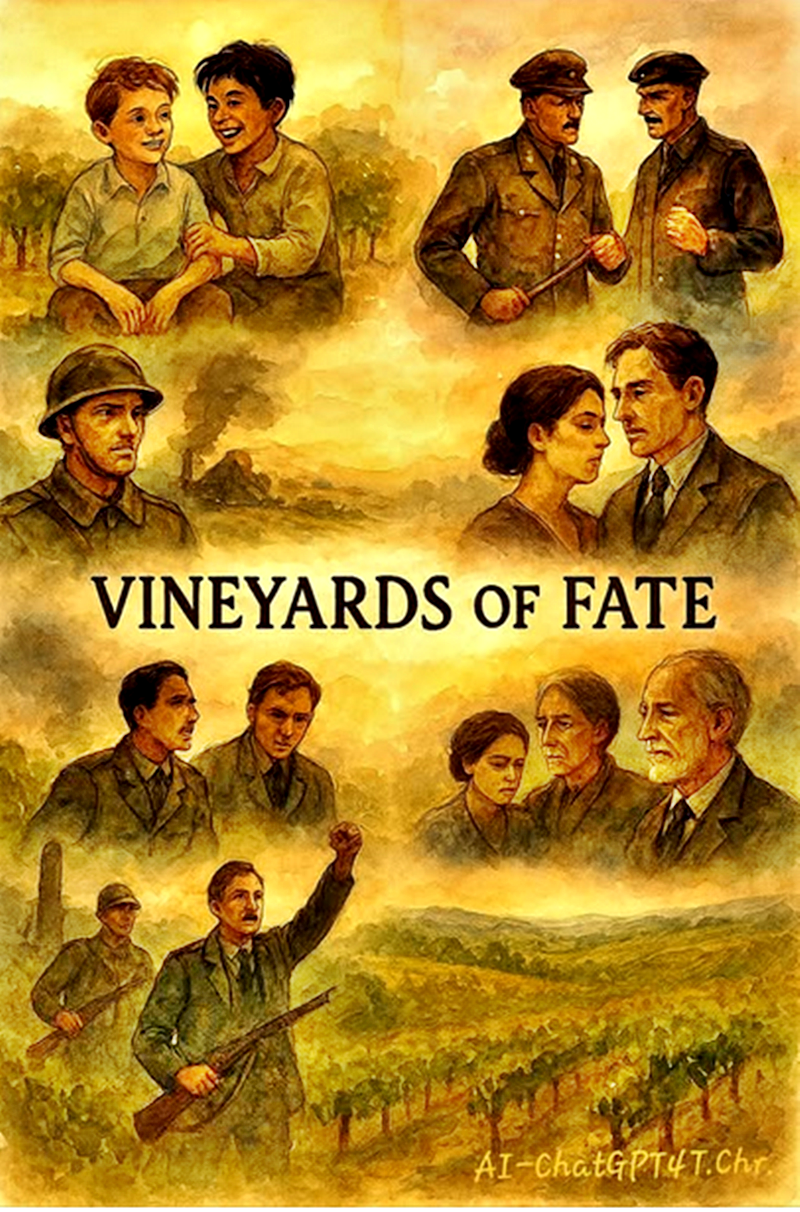VINEYARDS OF FATE.

By AI-ChatGPT4-T.Chr.-Human Synthesis-29 September 2025
Birth of Two Lives.
In the sun-drenched hills of Emilia-Romagna, in the summer of 1901, two lives began beneath very different roofs. Alfredo Berlinghieri, heir to a sprawling estate, was born into silk and light, cradled by hands that never knew labor. A mile down the dirt road, Olmo Dalcò entered the world in a humble peasant cottage, illegitimate, small, and fierce-eyed, as if he had been sent to challenge the world itself.
Fate, or perhaps mere chance, brought them together in childhood on the wide lawns of Alfredo’s estate, where Olmo’s mother labored in the kitchen and the two boys ran freely among orchards and vineyards. Alfredo, delicate and thoughtful, envied Olmo’s untamed courage; Olmo, wild and perceptive, admired Alfredo’s golden world, yet sensed its fragile cruelty. Together, they built forts, fished in irrigation canals, and dreamed of a world beyond the narrow lines of class, bound by laughter, mischief, and the instinctive loyalty of youth.
The First Tremors of History
Alfredo, heir to wealth, was groomed for privilege, taught the management of lands and the necessity of appearances. Olmo, exposed to toil and hardship, absorbed the rhythm of labor and the injustice etched into every furrowed brow. World War I swept over Italy like a storm. Alfredo served behind the lines, shielded by family connections, seeing violence but untouched by it.
Olmo, smaller yet resolute, enlisted with the workers’ battalions, seeing the full cruelty of war and feeling it in his bones. When they returned, their reunion was tender yet strained. Alfredo carried the burden of expectation; Olmo carried the fire of ideals, the seed of revolt in his heart.
Rise of Fascism and Betrayal
The 1920s brought change and menace. Fascism rose, and with it Attila, the sadistic overseer hired to keep peasants in line, a man whose cruelty became legend on the estate. Alfredo, weak in courage yet steadfast in loyalty to his family’s façade, struggled to navigate the dangerous currents, while Olmo, embracing his role as spokesman for the workers, stoked rebellion with speeches, strikes, and subtle acts of defiance.
Their friendship, once effortless, became a battlefield of ideology, emotion, and unspoken accusation. Love, too, entered their lives as both blessing and torment. Alfredo fell for Isabella, sharp, beautiful, and calculating, while Olmo’s heart belonged to Lucia, fiery and unyielding. Passion intertwined with jealousy, desire clashed with duty, and the two men learned that love, like friendship, could wound as deeply as it could nourish.
War and Resistance
World War II brought horrors anew. Olmo joined the Resistance, risking everything against fascist forces, while Alfredo, torn between conscience and family loyalty, offered shelter to fugitives, never fully rebelling but never betraying the oppressed. The estate became a battlefield. Attila, drunk with power and brutality, attacked with a small militia, only to be met by Olmo’s cunning and Alfredo’s hesitant courage. The night was chaos—smoke, flame, screams—and by dawn, the overseer was gone, the estate scarred, the two men bloodied but alive, their bond renewed in shared danger.
Love, Loss, and the Next Generation
In the fragile peace of the postwar years, tragedy and desire returned. Isabella fell ill and died, leaving Alfredo a son, Pietro. Lucia abandoned Olmo, taking her passion but leaving a daughter, Sofia. Alfredo sought to protect Pietro from Olmo’s revolutionary ideals. Olmo raised Sofia with fire and principle, refusing to let her inherit the passivity of peasants past. Their rivalry intensified, not with violence but with words and memories, the weight of history pressing on every decision. Rumors, lawsuits, whispers of betrayal, and the shadow of the past hung over the estate like storm clouds. Love arrived again, unpredictable and dangerous.
Alfredo became entangled with Caterina, a widow whose beauty was rivaled only by her cunning, while Olmo, captivated by Elisabetta, a scholar whose fiery ideals mirrored his own, found his heart rekindled. Passion and jealousy flared with the force of youth, proving that even in age, desire could be destructive. Pietro and Sofia, children of these entwined legacies, grew up caught between loyalty and curiosity, their friendship cautious, their lives marked by echoes of old conflicts.
Fire and Reckoning
One winter, a barn caught fire—rumored sabotage, perhaps revenge or accident. Alfredo raced through flames to save Pietro; Olmo, undeterred, saved Sofia. Smoke, fire, and fear blurred the lines between heroism and recklessness. In the aftermath, scandal and legal battles roared through the villages. Alfredo faced ruin, yet never betrayed Olmo. Their bond, however fraught, was too deep to sever, a tether spanning decades of shared history.
Twilight and Reflection
The decades passed. The estate, the land, the vineyards became witnesses to lives intertwined with love, betrayal, courage, and sorrow. Alfredo and Olmo, now old men, walked together beneath the silvered light of dawn, their rivalry softened by age but never extinguished. Their children, their legacies, the laborers, and the land itself bore the imprint of their choices. The past, with all its violence, passion, and sacrifice, was not forgotten. In that understanding lay a quiet victory, the knowledge that they had survived the century together, bound by fate, friendship, and the relentless passage of time.
Above the hills of Emilia-Romagna, the sun rose golden, and the vineyards stretched endlessly. Alfredo lifted a glass, Pietro at his side; Olmo nodded silently, Elisabetta beside him. Twinds of history blew through the estate, carrying whispers of the past, warnings for the future, and the eternal question of what it meant to live fully in a world that demanded sacrifice, courage, and love.
In that moment, the story of two men—rivals, companions, brothers of fate—stood complete, a testament to the beauty and tragedy of human life..
